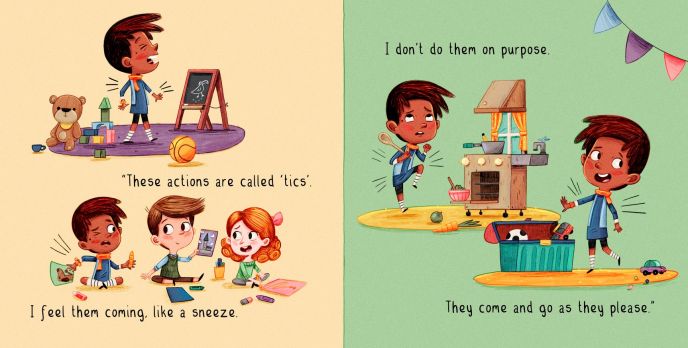
My Cousin has Tourettes!
Award-winning social entrepreneur and best-selling children’s author, Alex Winstanley, shares the story behind his most recent book, ‘My Cousin Has Tourettes’.
Growing up, I spent a lot of time with my older cousins, Tom and Sam. We would do all sorts together and I really looked up to them both. I vividly remember my tenth birthday, when I noticed that Sam, who is a couple of years older than me, was tapping my shoulder. I looked to him for a response but he was just looking away and chatting to family. I assumed he was just joking. I later noticed that he was putting his mouth to my shoulder, which as a child I found confusing but never really questioned it. It was only when my parents told me a few months later that Sam has been diagnosed with Tourettes that it all started to make sense.
I found that Tourettes quickly became part of Sam’s personality and was never really noticed or commented upon by any family members. Seeing him have the urge to put his tongue towards a kettle or repeating words I would say didn’t bother me. However this was different for Sam’s peers at school. I remember my Mum telling me that Sam had been being bullied at school, at which point his older brother Tom had decided to encourage Sam to inform school staff. This resulted in Sam speaking in front of his peers about how Tourettes affected him, which actually led to the one of the former bullies becoming friends with Sam. This is reflected in my latest children’s book, ‘My Cousin Has Tourettes’.
The book is inspired by Sam’s story and informed by the experiences of Sam and other people who live with Tourettes. The book tells the story of two cousins who grow up together, with one of them having Tourettes and being supported at times by his cousin. Using rhyme and engaging illustrations, the book aims to highlight some typical symptoms of Tourettes, whilst also starting the conversation about how people can be affected by Tourettes in many different ways. The illustrator, Adam Walker-Parker, has done an amazing job of depicting tics in a visually engaging way for children. My favourite illustration from the book is probably right at the end, where the reader sees the cousin who has Tourettes with his family, living the life he always dreamed of. This was the key message that I wanted to get across to children and young people, that just because someone has Tourettes, they can still achieve their goals just like someone who might not have Tourettes. I also really like the assembly scene, where the reader might spot that a particular character, who has not been quite so nice to the cousin in the past, actually begins to realise that the cousin is a lovely person and as the book continues, you might spot that the character actually becomes the cousin’s partner.
My other favourite scene shows the cousin on the bus, clearly looking quite anxious. This scene gives the reader a real feel as to how it might feel being stared at just because you might move, sound or act differently to others (as you might be able to tell, I’m very passionate about championing and celebrating difference, rather than challenging it!). Adam made it obvious that there are a number of characters staring at the cousin, making him even more stressed and therefore bringing on his tics. An interesting early change that I made to this page was to change the words from ‘anxious or stressed’ to ‘excited or stressed’, to reflect that tics can be brought on through a range of emotions, not just stress. All of this was informed through feedback from many different people living with Tourettes.
I am very passionate about starting the conversation about long-term health conditions that aren’t spoken about enough, such as Tourettes. I hope that this book does that, in a child-friendly and supportive way, whilst depicting an inclusive and diverse range of characters. There are lots of subtle messages for children and families to pick up on together, whilst remaining as positive and realistic as possible. I didn’t want the book to just show somebody shouting or swearing, as is often assumed when people hear the word Tourettes. Instead, I wanted to try to suggest a range of ways that people can be impacted by Tourettes, whilst still leading a great life. There also a number of characters and crossovers from the other books I’ve written on conditions such a dementia and depression – so keep an eye out for those!
‘My Cousin Has Tourettes’, and the rest of the series, is currently available on Amazon worldwide, with sales directly supporting the work of my non-profit organisation, Happy Smiles Training CIC, which delivers inclusive training to schools, businesses and more, led by disabled young adults. During a recent school workshop, a teacher asked me if I would be writing about tics and Tourettes as ‘more and more children are presenting with tics’, which really emphasised the need for this book. I hope that you’re able to purchase the book and, if so, please let me know your thoughts!
Take care!
Alex
Facebook & Instagram - @alexwinstanleyauthor
Twitter - @alexwauthor


